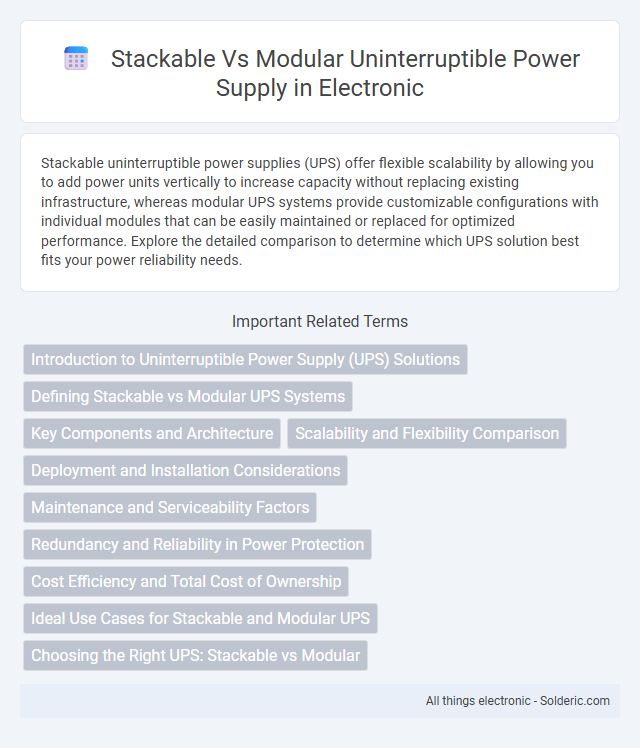Stackable uninterruptible power supplies (UPS) offer flexible scalability by allowing you to add power units vertically to increase capacity without replacing existing infrastructure, whereas modular UPS systems provide customizable configurations with individual modules that can be easily maintained or replaced for optimized performance. Explore the detailed comparison to determine which UPS solution best fits your power reliability needs.
Comparison Table
| Feature | Stackable UPS | Modular UPS |
|---|---|---|
| Definition | Multiple UPS units stacked to increase capacity. | UPS designed with plug-and-play modules for scalability. |
| Scalability | Limited by physical stacking capacity. | Highly scalable with add/remove modules easily. |
| Maintenance | Maintenance on entire stacked unit required. | Hot-swappable modules allow maintenance without downtime. |
| Cost | Lower initial cost, higher upgrade cost. | Higher initial cost, cost-effective scalability. |
| Redundancy | Limited redundancy; stack failure affects entire backup. | Built-in redundancy with independent modules. |
| Space Efficiency | Requires more physical space due to stacking. | Compact design with optimized space usage. |
| Setup Complexity | Simple stacking arrangement. | Requires configuration for module integration. |
Introduction to Uninterruptible Power Supply (UPS) Solutions
Uninterruptible Power Supply (UPS) solutions provide critical backup power to protect your devices from unexpected outages and voltage fluctuations. Stackable UPS units allow scalable power capacity by connecting multiple identical modules, enhancing redundancy and ensuring continuous performance. Modular UPS systems offer flexible configurations with hot-swappable power modules, enabling easy maintenance and expansion to meet evolving power requirements.
Defining Stackable vs Modular UPS Systems
Stackable Uninterruptible Power Supply (UPS) systems are designed to connect multiple independent units in parallel, allowing you to increase capacity and redundancy by simply adding more devices. Modular UPS systems feature internal hot-swappable power modules within a single chassis, enabling scalable power and simplified maintenance without downtime. Understanding these definitions helps you choose between expanding power through combined units or flexible modules based on your specific reliability and scalability needs.
Key Components and Architecture
Stackable Uninterruptible Power Supplies (UPS) feature modular power units designed to be added in parallel, enhancing scalability and redundancy through interconnected battery and inverter modules. Modular UPS architecture includes centralized control systems that manage power distribution, with hot-swappable components such as power modules, battery packs, and management cards to ensure continuous operation and minimize downtime. You benefit from tailored power protection by selecting a stackable UPS for scalable capacity or a modular UPS for flexible, serviceable designs.
Scalability and Flexibility Comparison
Stackable uninterruptible power supplies (UPS) offer seamless scalability by allowing you to simply add more units to increase capacity, making them ideal for growing power demands without complex rewiring or reconfiguration. Modular UPS systems provide greater flexibility with hot-swappable power modules and customizable configurations, enabling tailored redundancy and capacity adjustments to match changing operational needs. Your choice depends on whether you prioritize straightforward scalability with stackable units or adaptive flexibility with modular systems for evolving power protection requirements.
Deployment and Installation Considerations
Stackable uninterruptible power supplies (UPS) offer streamlined deployment since they can be easily connected and expanded by stacking units, minimizing floor space and reducing installation time. Modular UPS systems provide flexible scaling with hot-swappable components, enabling You to customize power capacity and serviceability without disrupting the existing setup. Choosing between stackable and modular UPS depends on Your specific needs for rapid deployment versus adaptable scalability in installation environments.
Maintenance and Serviceability Factors
Stackable uninterruptible power supplies (UPS) allow for simplified maintenance by enabling individual units to be serviced or replaced without shutting down the entire system, enhancing operational continuity. Modular UPS designs offer hot-swappable modules that improve serviceability, reducing downtime and facilitating faster repairs or capacity upgrades. Both systems prioritize ease of access to components, but modular UPS units typically provide greater scalability and more granular fault isolation during maintenance.
Redundancy and Reliability in Power Protection
Stackable Uninterruptible Power Supplies (UPS) offer enhanced redundancy by allowing multiple units to be linked, ensuring continuous power supply if one unit fails, while Modular UPS systems provide scalability and high reliability through easily replaceable power modules without shutting down your equipment. Both systems improve power protection but Stackable UPS is preferable for redundancy in smaller setups, whereas Modular UPS excels in critical environments requiring seamless maintenance and fault tolerance. Your choice depends on whether you prioritize quick redundancy or long-term reliability and scalability in your power infrastructure.
Cost Efficiency and Total Cost of Ownership
Stackable uninterruptible power supplies (UPS) offer cost efficiency by enabling businesses to expand power capacity incrementally, reducing initial capital expenditure and minimizing the need for oversized systems. Modular UPS systems optimize total cost of ownership through hot-swappable power modules, which decrease maintenance downtime and extend equipment lifespan. Both designs improve operational flexibility, but stackable units often provide lower upfront costs, while modular UPS solutions can deliver better long-term savings via reduced service and upgrade expenses.
Ideal Use Cases for Stackable and Modular UPS
Stackable uninterruptible power supplies (UPS) are ideal for small to medium businesses or remote offices needing easy scalability and straightforward expansion without complex configuration. Modular UPS systems suit data centers and critical infrastructure environments requiring high availability, redundancy, and flexible capacity upgrades with minimal downtime. Your choice depends on whether you prioritize simple incremental growth or advanced customization and reliability.
Choosing the Right UPS: Stackable vs Modular
Choosing the right uninterruptible power supply (UPS) depends on your specific power continuity needs and scalability requirements. Stackable UPS systems offer straightforward expansion by physically adding battery modules to increase runtime, making them ideal for smaller setups or predictable load increases. Modular UPS units provide flexible, hot-swappable power and battery modules, enhancing reliability and ease of maintenance for growing or mission-critical environments where minimal downtime is essential.
Stackable vs Modular Uninterruptible Power Supply Infographic

 solderic.com
solderic.com